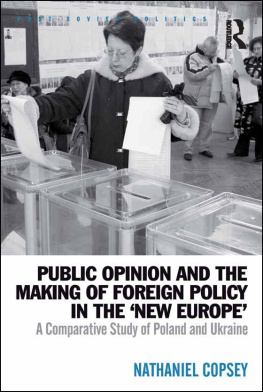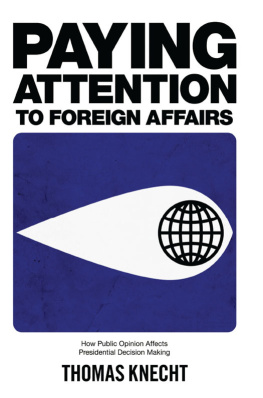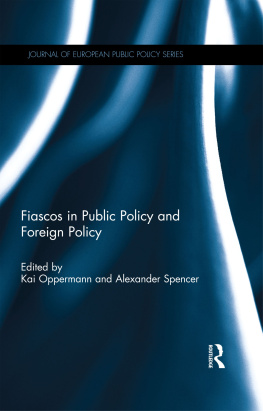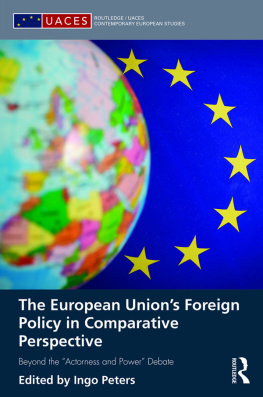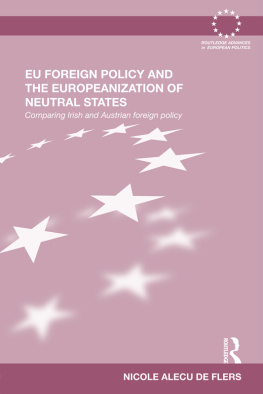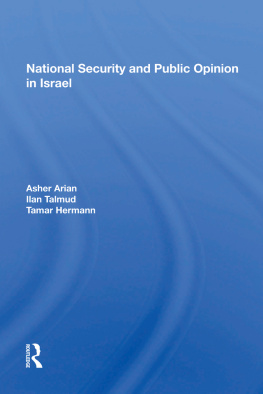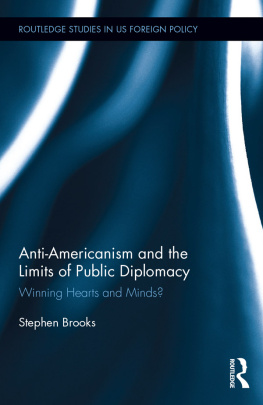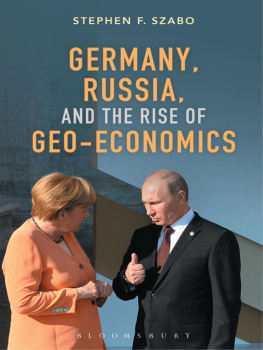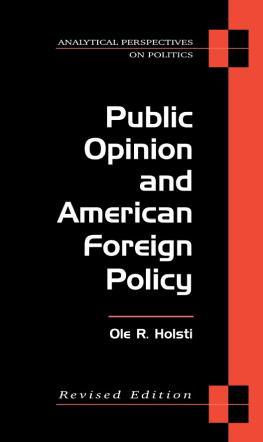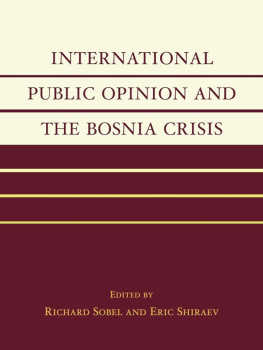PUBLIC OPINION AND THE MAKING OF FOREIGN POLICY IN THE NEW EUROPE
Post-Soviet Politics
Series Editor: Neil Robinson, University of Limerick, Ireland
The last decade has seen rapid and fundamental change in the countries of the former Soviet Union. Although there has been considerable academic comment on these changes over the years, detailed empirical and theoretical research on the transformation of the post-Soviet space is only just beginning to appear as new paradigms are developed to explain change.
Post-Soviet Politics is a new series focusing on the politics of change in the states of the former USSR. The series publishes original work that blends theoretical development with empirical research on post-Soviet politics. The series includes work that progresses comparative analysis of post-Soviet politics, as well as case study research on political change in individual post-Soviet states. The series features original research monographs, thematically strong edited collections and specialized texts.
Uniquely, this series brings together the complete spectrum of work on post-Soviet politics, providing a voice for academics world wide.
Also in the series
Authoritarian Backlash
Russian Resistance to Democratization in the Former Soviet Union
Thomas Ambrosio
ISBN 978 0 7546 7350 7
Russian-Belarusian Integration
Playing Games Behind the Kremlin Walls
Alex Danilovich
ISBN 978 0 7546 4630 3
The Russian Democratic Party Yabloko
Opposition in a Managed Democracy
David White
ISBN 978 0 7546 4675 4
Georgia from National Awakening to Rose Revolution
Delayed Transition in the Former Soviet Union
Jonathan Wheatley
ISBN 978 0 7546 4503 0
Public Opinion and the Making of Foreign Policy in the New Europe
A Comparative Study of Poland and Ukraine
NATHANIEL COPSEY
Aston University, UK
First published 2009 by Ashgate Publishing
Published 2016 by Routledge
2 Park Square, Milton Park, Abingdon, Oxon OX14 4RN
711 Third Avenue, New York, NY 10017, USA
Routledge is an imprint of the Taylor & Francis Group, an informa business
Copyright Nathaniel Copsey 2009
Nathaniel Copsey has asserted his right under the Copyright, Designs and Patents Act, 1988, to be identified as the author of this work.
All rights reserved. No part of this book may be reprinted or reproduced or utilised in any form or by any electronic, mechanical, or other means, now known or hereafter invented, including photocopying and recording, or in any information storage or retrieval system, without permission in writing from the publishers.
Notice:
Product or corporate names may be trademarks or registered trademarks, and are used only for identification and explanation without intent to infringe.
British Library Cataloguing in Publication Data
Copsey, Nathaniel.
Public opinion and the making of foreign policy in the 'New Europe' : a comparative study of Poland and Ukraine. --(Post-Soviet politics)
1. Poland--Foreign relations--Ukraine. 2. Ukraine--Foreign relations--Poland. 3. Poland--Foreign relations--Ukraine--Public opinion. 4. Ukraine--Foreign relations--Poland--Public opinion. 5. Public opinion--Poland. 6. Public opinion--Ukraine. 7. Poland--Foreign economic relations--Ukraine. 8. Ukraine--Foreign economic relations--Poland. 9. Poland--Economic policy--1990-10. Ukraine--Economic policy--1991-
I. Title II. Series
327.4'380477-dc22
Library of Congress Cataloging-in-Publication Data
Copsey, Nathaniel.
Public opinion and the making of foreign policy in the 'New Europe' : a comparative study of Poland and Ukraine / by Nathaniel Copsey.
p. cm. -- (Post-Soviet politics)
Includes bibliographical references and index.
ISBN 978-0-7546-7898-4 (hardback) -- ISBN 978-1-3156-0294-3 (ebook)
1. Poland--Foreign relations--1989---Public opinion. 2. Ukraine--Foreign relations--1991---Public opinion. 3. Public opinion--Poland. 4. Public opinion--Ukraine. 5. Poland--Foreign relations--Ukraine. 6. Ukraine--Foreign relations--Poland. I. Title.
JZ1625.C67 2009
327.438--dc22
2009031063
ISBN 9780754678984 (hbk)
ISBN 9781315602943 (ebk)
ISBN 9781317073505 (ebk-ePUB)
Contents
List of Figures
Acknowledgements
I would like to thank Aleks Szczerbiak, Zdenek Kavan and Tim Bale at the University of Sussex, George Kolankiewicz at the School of Slavonic and East European Studies, Tim Haughton at the University of Birmingham and Peter Rodgers at Aston University for their insightful comments on earlier drafts of this book. For invaluable research assistance in Lviv, I am indebted to Bozhena Pelenska at the Ukrainian Catholic University and Viktor Susak of the Ivan Franko National University. In Poland, my thanks are due to Mariusz Sielski of the Ecole Sciences Polytechniques (Paris) and Mirona Ogryzko-Wiewirowska at the Marie Curie Skodowska University. To Mariusz I am particularly grateful for providing the inspiration for this book during a study trip to western Ukraine organised by the College of Europe in 2002 and indeed for many other fascinating conversations over the years. I am grateful to the Centre for East European Language Based Area Studies (CEELBAS) for funding the post-doctoral research fellowship at the University of Birmingham which provided me with the time to write this book, and to the University Association for Contemporary European Studies (UACES) for funding the focus groups in Poland and Ukraine on which so much of this study is based. My wonderful parents and brother as always provided inspiration and support.
I dedicate this book to my mother and father.
Figure I.1 Eastern Europe, circa 2007
Chapter 1
Introduction
Since the unveiling of the European Unions Neighbourhood Policy (ENP) immediately after the May 2004 enlargement, the spotlight has been cast on the Unions eastern borders. Yet these new agreements between the Union and its neighbours do not envisage further enlargement. Thus for all the talk of reuniting Europe or states returning to Europe since 1989, by drawing a new boundary between the EU and its eastern neighbours, the Union has created a frontier that has been popularly described in the frontier states as the new Berlin Wall. This is a book about the borderland communities that live on either side of the new European divide and how successful or otherwise they are in influencing the foreign policies of their respective nation-states.
The two countries that form the focus of this book, Poland and Ukraine, were chosen primarily because the contrasting political, economic and social positions of these two states capture the essence of the new east-central Europe. Poland symbolises the success of many post-communist states in this region: its path to liberal democracy and the market economy is more or less complete, and it is a member of both NATO and the European Union. Ukraine, despite the flurry of excitement that followed the Orange Revolution, remains the borderland that its name implies a geopolitical no mans land with little immediate prospect of membership of either the EU or NATO, the successful outcome of the European Neighbourhood Policy is not just an issue of importance for Ukraine or Poland, but also to a certain extent for the security and prosperity of the whole EU. The success or failure of the ENP and the Eastern Partnership will reveal both the extent to which the Union is able to stabilise the countries that lie immediately beyond its present frontiers and the limits to its much-vaunted soft power and influence. Poland has acted as an advocate of Ukrainian integration within the European Union over the past few years; therefore what the Union eventually offers to Ukraine will also shed light on the extent of Polish influence on the EUs foreign policy towards the east. How Poland and Ukraine interact is of crucial importance because their bilateral partnership is probably the only one of its kind to span the distance between the former Soviet Union and the West. That Poland and Ukraine can bridge this divide is made possible by virtue of the fact that they treat each other as equals, and in terms of the relations between EU states and their poorer neighbours, this is exceptional. Consequently, the relationship between Poland and Ukraine is a vitally important one for the European Union as a whole.

